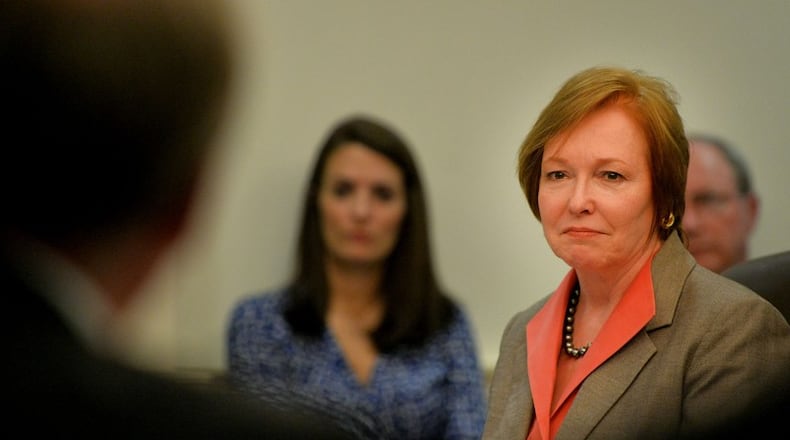Brenda Fitzgerald, the director of the Atlanta-based Centers for Disease Control and Prevention, resigned Wednesday after a news outlet detailed stock trades that appeared to present a conflict of interest.
A spokesman for the Department of Health and Human Services said Fitzgerald, who previously served as Georgia's top public health official, tendered her resignation after detailing the scope of her financial holdings to health chief Alex Azar.
“Dr. Fitzgerald owns certain complex financial interests that have imposed a broad recusal limiting her ability to complete all of her duties as the CDC Director,” said spokesman Matt Lloyd.
“Due to the nature of these financial interests, Dr. Fitzgerald could not divest from them in a definitive time period,” he added.
The news came less than a day after Politico reported that Fitzgerald, 71, purchased tobacco company stock a month after she took the high-profile job. That raised eyebrows since the CDC is tasked with reducing tobacco use and promoting public health.
An HHS spokesman told the news outlet that the stock purchases were made by Fitzgerald’s financial manager and that she later divested.
The swiftness of Fitzgerald’s resignation left many in the health care community stunned. It comes as the CDC, which employs thousands of employees across several campuses in metro Atlanta, is dealing with a particularly deadly flu season.
Her departure also comes several weeks after Patty Murray of Washington, a top Senate Democrat, raised questions about Fitzgerald's ability to fully tackle two of the biggest items on the $7 billion agency's plate -- fighting the opioid crisis and cancer -- given several previous investments.
“I repeatedly raised concerns about Fitzgerald’s conflicts of interest and broad recusals from work impacting public health issues like cancer and opioids—this is yet another example of this Administration’s dysfunction and questionable ethics,” Murray tweeted Wednesday.
The Washington Post reported that Anne Schuchat, a CDC veteran and the agency’s principal deputy director, will serve as an acting replacement until a permanent successor can be named.
CDC tenure
Trained as an obstetrician-gynecologist, Fitzgerald was tapped by the Trump administration to lead the CDC last July after serving for six years as the first head of the Georgia Department of Public Health.
She has been a relatively low-key presence at the agency ever since, making few public statements and sending deputies to testify at several Capitol Hill hearings.
But Fitzgerald did find herself caught in an uproar on a few occasions, including last month after reports surfaced that the CDC and other federal health agencies were being barred from using words such as "evidence-based," "vulnerable" and "diversity" in their budget documents.
She fired back at those reports, denying that any words were banned at the CDC.
“We will continue to talk about all our important public health programs,” she said.
Fitzgerald was also criticized for cracking down on the agency's outreach to the media and public, as well as for accepting $1 million from Coca-Cola for an anti-childhood obesity initiative while she led the Georgia Department of Public Health.
As Georgia’s top health official, she won praise for her efforts to combat the spread of the Zika and Ebola viruses. She also helped reduce wait times for a program that provides lifesaving medications to thousands of uninsured Georgians with HIV or AIDS.
Fitzgerald is the second top health appointee from Georgia to resign from the Trump administration under scrutiny. Health chief Tom Price, who helped bring Fitzgerald on board, stepped down from his Cabinet post in September after news reports detailed a series of private charter flights he took on the public's dime.
Nearly all Georgia elected officials kept their distance from Fitzgerald on Wednesday, but one who did defend her was her Obama-era predecessor, Tom Frieden.
“I have spoken with Dr. Fitzgerald and believe her when she says that she was unaware that a tobacco company investment had been made,” he tweeted.
“Dr. Fitzgerald impressed me as someone who was committed to supporting public health and protecting Americans,” Frieden added.
About the Author
The Latest
Featured




